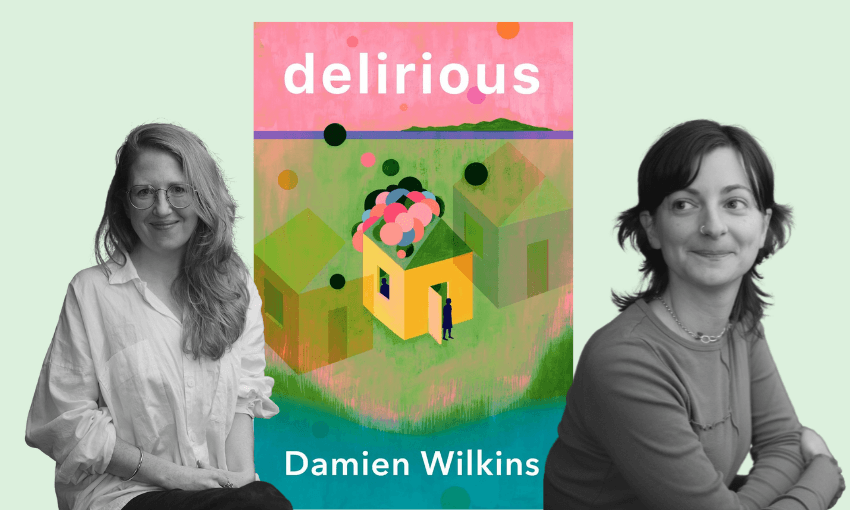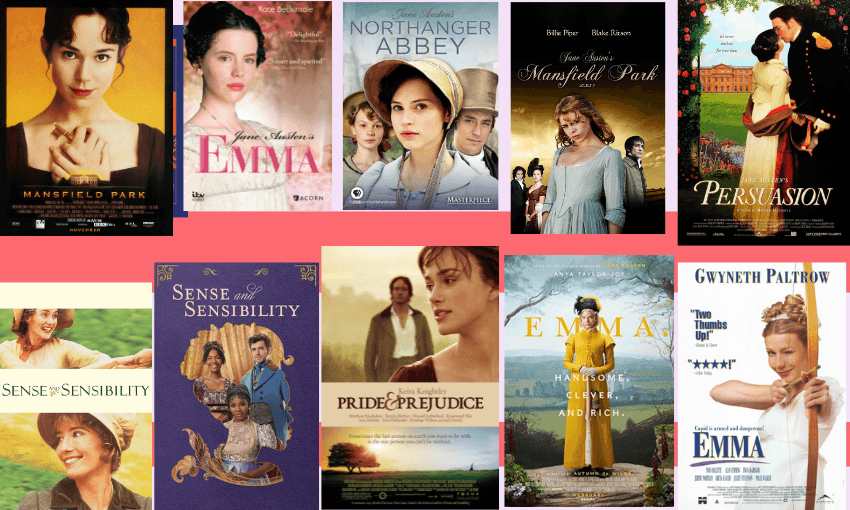Welcome to a new series in which two Spinoff writers read a book and then discuss what we thought about it. In this edition, Gabi Lardies and Claire Mabey discuss Delirious by Damien Wilkins (Te Herenga Waka University Press).
Claire: Gabi, you’ve just finished Delirious: what was your ultimate, overall impression?
Gabi: I loved this book. It arrived in the mail nice and chunky so I didn’t gobble it all up in one go, but read it each night over a week or so. I kept thinking about Mary, Pete, Colin and Will during the day. I’m afraid of putting people off by saying it’s about ageing and approaching DEATH. In truth Wilkins has such a light touch that reading never feels heavy or too sad.
I found it amazing that a book about traumatic events was also so funny, and even at times whimsical. I have to admit I avoided this novel when it first came out because the death of a child is my worst, worst nightmare. But in Wilkins’ hands I found I could go through it because of the lightness you mention but also the time structure, which loops.
It’s not the most appealing topic, but there’s so much poetry and beauty in the book. Also, not to stir your nightmares, but children do die and then people have to keep living. I thought this was such a powerful portrait of that. The looping time gives a reassuring distance from that underlying central death in the book.
Yes! The novel is unflinchingly honest about the facts of life: namely that there is death and sometimes it comes early. It takes a brave writer to imagine how that plays out for the living. The distance also lets us have moments where we see the family together – including Claire, Mary’s sister, who I came to really love – so all of the characters remain intimate and tangled up in Mary and Pete’s memories.
The memories were some of my favourite bits of the book, when the “delirious” edges crept in. Like this bit, when Mary is remembering when her sister Claire was so sick with cancer she had to be moved in a sling: “With her now tiny legs folded up against her body as the sling raised and lowered her, she looked like a delicate animal, a foal perhaps, being weighed. She might have had four legs tucked up underneath her.”
I just love the way Wilkins gets so close to his characters, right up to how their imaginations operate.
Yes! Just like time moves from the present to the past, the narration of the book alternates between the first person perspective of two characters, Mary and Pete, the bereaved parents. It is really this device that allows the other characters to unfold through their memories. I was rather struck by something Mary thought about Claire’s view of men: “In some profound way, she didn’t take them seriously. Putting them in a separate and inferior category, however, had the effect of making them special too. She was drawn to physical strength and beauty. She was shockingly superficial, since there was no depth there, nothing to look for beyond the surface.” I was shook by this observation, very illuminating and quite harsh.
I also loved how Pete’s mother changed through the book. When we first meet her, she’s remembered ravaged by age and dementia – complete with anti-semitic torrents, hitting nurses with a stick and stuck in self-absorbed fantasies. Then through the book we learn how she collected all sorts of ceramic birds, and though his parents didn’t want him to touch them, she let Will play with them. She would call Mary and Pete to tell them about how Will had cleverly arranged the birds, “as if she fully approved.” Will was a child who didn’t fit in with others easily, so there’s a sense that Mary and Pete were reassured by this, and that Will flourished under her care. Later in the book we learn that she was a fierce protector of a young and somewhat delicate Pete, when he says to Mary, “She helped me… in my life. She was always looking out for me and supporting me.”
The birds! I also found the image of a garden of ceramic birds hallucinatory, dreamy. I would love to ask Wilkins how he found these people. What he had to do to get into their minds the way he did. I found it fascinating that Pete is a librarian and Mary is an ex-police officer. Those roles mirror their personalities in a way. I found how muted they are with each other both moving and frustrating. Did you find that?
Their relationship is remarkably understated, there’s hardly even any dialogue between them, it all seems to be between the lines. Is this what marriage is like after so many years? I don’t know!
I also wondered what you thought about the way the story is very grounded here in Aotearoa through cultural interactions? The fact Pete and Mary are Pākehā and feel like they’re feeling their way into an Aotearoa of today, compared with their childhoods/early adulthoods.
This sense of trying to find their way around today’s Aotearoa really grows through the book, which I appreciate as it feels natural and not slapped in your face. I think plenty of older (and younger!) Pākehā are feeling their way into today’s Aotearoa in a much similar way to Pete and Mary. It feels honest and nuanced and their trepidations real. There was one line of Mary’s that struck me for its honesty. She’s been struggling with, well, internalised racism, and feeling kind of fed up with Pete having a sort of reverence for te ao Māori, and she thinks, “It was childish of her, this antagonism. She was a remnant.” She can see that much of society has moved on and she’s a bit stuck in the past. She’s struggling to get past it.
Mary is a complex character, right to the end. For me she’s where a lot of the delirium came in (as well as Pete’s mum. The poor woman. But the black comedy of her actual delirium was so wonderful!). I felt like, through Mary, the book was always on the verge of a nightmare. Like this bit when Mary is closely watching Claire (again – there is something so fractious and dreamy about sisters), observing how she’d changed: “She didn’t like Claire’s face when she yawned. It was pulled out of shape. Claire wasn’t bothering now to cover it. Her mouth opened wide and then closed. It was out of character. She gulped and gulped.”
I got from this the image of drowning. Cancer is such a stealthy leech, pulling a person away and under.
Those lines disturbed me! I feel haunted by that image of Claire’s face. Claire… I think I missed the black comedy :O
Maybe I have a terrible sense of humour! But I found the radical shift in Pete’s mum’s personality when she was sick with the delirium to be horribly funny. Just that shocking, unreal change in the way someone behaves that unlocks all the hidden thoughts inside them, or their alter ego …
OH!!! Yes! That power shift WAS funny, in a very dark way!
The lack of control? Maybe that’s at the heart of this book? The fact we just can’t control so much of life let alone death. So while Delirious broke my actual heart over again, it also helped repair it by showing such resilience and learning (Pete does so much determined learning).
Oh Pete! He was really trying. It is interesting that while the book is probably split between his and Mary’s points of view quite evenly, it’s Mary that has stuck with me more.
Me too. It’s Mary that remains something of a puzzle to me and who I wanted to keep talking to. She retains a certain coolness in the book: blunted by grief, perhaps. And I wanted to keep observing how she’d manage the rest of their lives.
I have so many questions about Mary. She kept surprising me. Not because her character was underdeveloped or confusing, but perhaps just how life twisted and turned and she had to sort of recalibrate in different ways. Perhaps this makes the book feel un-concluded. Even though things were narratively wrapped up, I didn’t really get a sense of rest or completion for Mary.
I agree. I finished the book and haven’t stopped wondering. I like it when a novel reflects life so closely and this novel is so close to life it’s almost psychedelic with it: so much detail, and beauty and harshness and weirdness. I like both that Wilkins left us knowing there was some life left to go for Mary and Pete, but that nothing is guaranteed for them either. Nobody knows what might happen next. Mary harbours things so close to her. She’s alone, in a way, despite Pete. Maybe that’s why she’s stuck with us; we’ve been let in.
Do you have any final thoughts you’d like to let loose on Delirious?
What struck me most about Delirious is how real it all felt. It started with the way that Mary and Pete inhabit their house, the little details like the curtain that was too short because the chimney sweep put it through the dryer, and then unfurled from there into how they inhabit the world and live in it. Perhaps it is fiction, but I can’t help but feel Wilkins must be the most astute observer of people and little, tiny, meaningful details.
The specificity, right? Not only of mindscapes but also those daily, mundane domestic details.
So, we’d highly recommend Delirious?
Absolutely! I have a very tender heart and it feels stronger for having read it.
The perfect finish. Thank you for talking with me Gabi!
Delirious by Damien Wilkins ($38, Te Herenga Waka University Press) is available to purchase from Unity Books.


